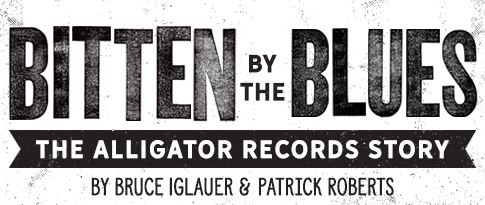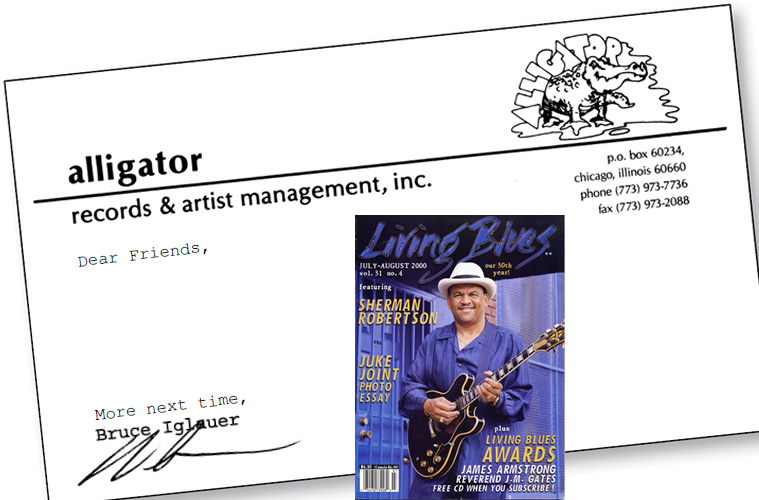Dear Friends,
I’m writing this from BMG Studios in New York where we’re beginning the mixes for Shemekia Copeland’s second album, Wicked. It’s a thrill to work with such a great young blues talent, and she just keeps growing as a singer and interpreter. With this album, she pushes the blues envelope just a bit, experimenting with some soul, funk, acoustic and rock influences in her blues, as is appropriate for a 21-year-old woman who grew up in Harlem. Her sensibility must be different from someone who’s been singing and living the blues for 50 years. Otherwise, blues will become an artifact (which is the big danger we face when fans demand “Sweet Home Chicago” every night).
We’ve also just finished a new album by West Coast guitarist Rusty Zinn. You may know Rusty from his two excellent and swinging Black Top albums, or from his years on the road with Kim Wilson. But what you may not know about Rusty is that he’s become a major league soulful blues vocalist who can move between classic Chicago sounds, R&B and rockers with equal honesty and chops. We recorded in Richmond, CA in a fast and furious eight days of recording and mixing. Rusty’s new album (we’re still working on a title) has a heaping helping of spontaneity and power. I’m very proud of it. Both new releases will come out in early September, so watch for them.
At the beginning of August, we’ll release That’s My Partner!, the joyful collabo-ration between two of the best friends in blues, Elvin Bishop and Little Smokey Smothers. Smokey taught Elvin the basics of blues back in the early ‘60s, and they jammed together all over the South Side. They’ve remained fast friends and playing buddies ever since. In January, Elvin brought Smokey to San Francisco for three nights of live recording at Biscuits & Blues. They tore up a dozen tough blues tunes, backed up by Elvin’s horn-heavy band, and created the kind of musical party that you can actually feel coming out of your speakers. It’s fun, it’s raw, it’s real.
Last time, I wrote about our first Johnny Winter album, Guitar Slinger, cut in 1984. As I told you, I was frustrated on our last night of basic recording. The last song wasn’t coming together, and Johnny and I were tense, nervous and irritable. Then, without warning or invitation, the studio owner (who lived upstairs) appeared with champagne to celebrate the engineer’s first year at the studio. Our concentration was broken, the song was lost (which might have happened anyway) and I exploded. I was angry with Johnny and myself, but I directed my anger to the studio owner, and just kept getting hotter. Eventually I announced (ok, I yelled) that we would move the project to another studio, and we were leaving! Johnny and Dick Shurman and Freddie Breitberg, the engineer, were flabbergasted, but I wouldn’t back down. So I packed up the master tapes, took Johnny back to his isolated suburban hotel, and decided that the next day I’d find another studio. Even though Dick and Freddie begged me to reconsider, I was too angry to be moved.
While Johnny fumed in his hotel room, I took the tapes downtown to find a studio and engineer that could reproduce the sounds on our rough mixes. I went to Chicago Recording Company, the best-known and respected studio in the city, but their finest engineer couldn’t bring the sounds together after one long and frustrating evening. With some reluctance, I went to Streeterville Studios. Freddie had been on their staff until he left to go to Red Label, the same studio I had just walked out of. I knew that the owner of Streeterville was not pleased with me; I had left with Freddie. But I was becoming desperate, Johnny was getting angrier with each passing day, and I could see that my immature stubbornness could destroy one of the most important albums of my career. But I couldn’t admit I had been wrong. And then I got lucky.
More next time,
Bruce Iglauer

